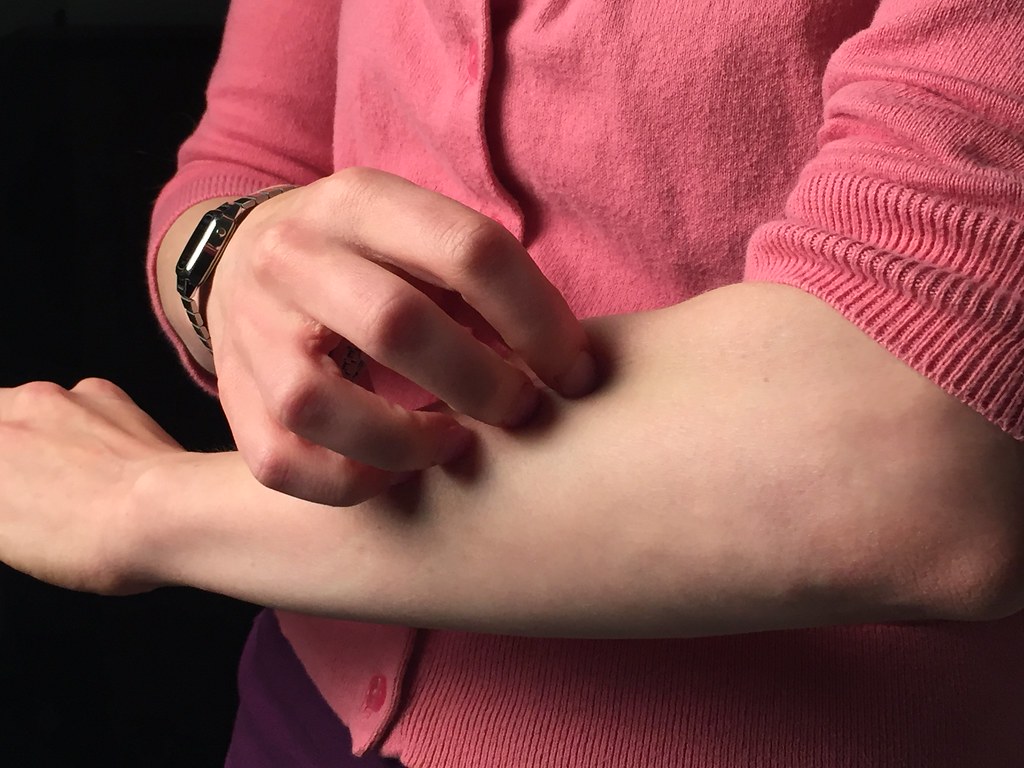This article will explain the possible causes, symptoms, and treatments for eczema in order to give you a better understanding of eczema, so if you suffer from eczema, read on, as this information will give you a better understanding of eczema and make your life a little easier.
What is eczema?
Often referred to as atopic dermatitis, eczema is a chronic inflammatory skin condition that is red, rough and itchy – an itch that longs to be scratched. Maybe you keep scratching until your skin is red and swollen, even bleeding.
Or maybe your child is suffering and itching because eczema is more likely to affect babies and toddlers. In fact, 9 million children in the U.S. suffer from the condition, and it could happen again. According to the National Eczema Association, eczema affects more than 7% of adults. 25% report that the symptoms appear in adulthood and that they never experienced them as children.
According to a recently published study, the prevalence of eczema follows a U-shaped curve: it is higher in children and adolescents, relatively lower in young adults, and increases again after age >70.
Eczema is one of the most common conditions in children, but it is likely to disappear in adulthood.
6 types of eczema:
- Hand eczema: as the name suggests, it only affects the hands.
- Contact dermatitis: the skin reacts to something it touches (such as laundry detergent) with a red, itchy reaction.
- Dyshidrotic eczema: it forms small blisters and bumps on the hands and feet and is more common in women.
- Stasis dermatitis: usually an inflammation of the skin of the lower legs, caused by chronic edema. Symptoms are itching, flaking and hyperpigmentation.
- Coin dermatitis: this type of eczema appears as coin-sized round spots on the skin and is more itchy.
- Neurodermatitis: like atopic dermatitis, it forms scaly patches on the skin. The only difference is that here the patches are significantly thicker.
Although eczema cannot be cured, sometimes the symptoms worsen and sometimes they disappear completely.
What causes eczema?
Researchers don’t know the exact cause of eczema flare-ups, but they do know what causes them – genes + environment. If you have a family history of eczema, you are more likely to develop it. As one study found, some people with eczema lack the proper proteins to create a strong barrier on the outermost layer of the skin (the epidermis). And when eczema sufferers are exposed to certain triggers (whether it’s certain soaps or emotional stress), their bodies send inflammatory signals to the immune system.
If you’ve been diagnosed with eczema, your symptoms can worsen just by being exposed to triggers, which are:
- Airborne allergens. Allergens are essentially triggers, and eczema flares up when these triggers – dust mites, pollen, air pollution, and pet dander – enter the skin and your immune system mounts a defense. You may itch, swell or develop hives.
- An environment that’s too cold or dry. They strip moisture from your skin, causing it to become brittle and leading to eczema flare-ups.
- Stress or anxiety. When you’re stressed, your nervous system instructs your body to protect itself by secreting hormones, including cortisol. Cortisol regulates the immune system, but when it suddenly flares up in a stressful situation, it promotes inflammatory cells and allergic antibodies will be produced quickly. Also, when we are in a state of panic, white blood cells release histamine which causes itching.
- Excessive sweating. This can irritate your skin, especially when it comes to areas where sweat tends to linger, such as the elbows, knees, and folds of the neck.
- Other irritants. Exposure to certain chemicals, such as soaps, perfumes and detergents, can irritate already sensitive skin and open the door to an inflammatory response. So, use everyday products that have the National Eczema Association seal of approval.
What are the best treatments for eczema?
There is no medication that can cure eczema immediately.
Although studies have shown that nearly 75% of children no longer suffer from eczema by the age of 16, eczema is a chronic condition and there is no guarantee that it will be cured for everyone as they grow older. Within the past few decades, the main treatments have been over-the-counter medications and prescription steroid creams, but if used over a long period of time (more than a year), they can lead to side effects such as thinning of the skin and cataracts.
In the past 10 years, more treatments have emerged, especially for severe, hard-to-treat cases:
Mild eczema: topical cream
If you have only mild eczema on several areas of your body, your dermatologist will prescribe a topical corticosteroid to reduce skin inflammation. They vary in strength but are not recommended for long-term use (1 in a row for more than 2 weeks) as they can thin your skin.
Moderate eczema: injections
If you suffer from moderate and don’t respond to topicals, contact your dermatologist and try Dupixent , according to a study published in 2016, more than half of people who used the product for 16 weeks found that their eczema symptoms improved by 75%.
Severe eczema: immunosuppressants
When eczema covers a large area of the body and produces a large inflammatory response (redness and itching), your dermatologist can help control the immune system by prescribing immunosuppressants to slow down eczema symptoms.The 3 most common medications are methotrexate, azathioprine, and cyclosporine. These medications are typically used in transplant patients and for chemotherapy to prevent the body from rejecting them. It is important for your doctor to monitor you very carefully and perform regular blood tests when you are taking these medications because taking them can upset your bowels, even damage your kidneys or liver, and make you more susceptible to infections.


